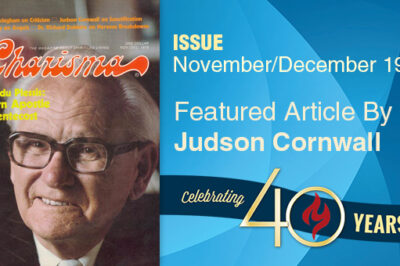One of the glorious evidences of the grace of God is His willingness to meet people where they are. He didn’t call Israel out of Egypt and then meet her at a prearranged rendezvous, He appeared to her in Egypt, communicated with her through Moses; revealed some of the greatness of His might in the plagues, and then led her out of Egypt with a strong hand. To have made coming out a requisite for meeting God would have banished these slaves from ever meeting God. God always meets people where they are.
But they could never have known Him in covenant relationship if they hadn’t followed God out of—into. Their separation from their old life made it possible for them to be separated unto God.
God’s patterns have not changed! In our generation He has poured out His Spirit upon “all flesh,” just as He promised, and He has required little or no change in the recipients as a qualification to being filled. He has just met people where they were and has given to them a measure of what He is—Holy Spirit.
But let no recently-baptized believer expect to stay in his former way of life very much longer, for after visiting His people God habitually issues the call, “Come out from among them and be separate, says the Lord. Do not touch what is unclean, and I will receive you. I will be a Father to you, and you shall be My sons and daughters, says the Lord Almighty” (2 Cor. 6:17-18).
This call involves an invitation, a direction, a division, a sanctification and a relationship.
AN INVITATION
“COME”
Religion loves to emphasize, “go and do,” but Jesus preferred to say, “come.” “Come to Me, all you who labor and are heavily burdened, and I will give you rest” (Matthew 11:28); “Come, follow Me …” (Luke 18:22). It is the difference between being sent and being led; between a commission and a companion. God’s call to the newly energized saints is not “get out,” but “come out.” He is ever the leader of His flock, and when it is time to change pastures He leads from the old to the new.
But when He begins to lead us out of the familiar and the old we had better follow Him, or we will find ourselves without His presence. He came to us where we were, but He intends to lead us into where He is. God blessing us in our carnality is not evidence of His approval of our way of life. It only evidences His willingness to meet us where we are to prepare us to follow Him. For those who accept this divine invitation there is a whole new, exciting life awaiting them, but for those who won’t come out, there will only be fading memories of the greatness of God’s presence.
A DIRECTION
“OUT…”
It is “come out” not “up” or “into.” Following the baptism in the Spirit so many feel that they are being called “into the ministry,” as though their draft number had been called. But long before God ordains a man to the ministry he calls him out of the old life. It was so with Moses, David, Elisha, the disciples, and Paul, to name a very few. To hear God’s call to “come” is wonderful. To really hear God call “come out” is superior. Before we can come “up” to righteousness we must come “out” of unrighteousness, and before we can come into divine service we must come out of human self-centeredness.
Israel expected to enter the promised land just a few weeks after leaving Egypt, but it took them 40 years. The problem was not the distance, or even so much their rebellion; the problem was that while God got them out of Egypt overnight it took forty years to get Egypt out of them.
So many of the dealings of God in our lives are ordained to getting the world out of us. God didn’t want slaves in the land of promise, He wanted free men, but the servile nature was slow getting out of these freed people. Similarly, God doesn’t want the carnally minded inhabiting His spiritual kingdom, so He brings us by a way that changes us from a carnal mentality to a spiritual one, for “to be carnally minded is death; but to be spiritually minded is life and peace” (Rom. 8:6).
“Come out,” is God’s call. “Come out of your Egypt and follow Me into what appears to be a wilderness. There I’ll teach you My guidance, provision, protection, covenants, and the glory of My presence. Out here, separated from your former way of doing, I’ll teach you My Word in very practical ways.”
A DIVISION
“…FROM AMONG THEM…”
Following God “out of automatically produces a division. Repeatedly I have been asked, “Now that I have been filled with the Spirit, what should I do about my old friends?”
“Just follow God,” I answer. “The division will be automatic.” Jesus warned that following Him would bring division between father and son, mother and daughter, and so on (Luke 12:51). Every step we take with God will automatically move us one step farther from the old life.
But who does Paul mean by “them?” How often this verse has been interpreted as calling for separation from anyone who does not share our vision, or concept or our experience. It is the old cry for association with sameness. But if we get all the hands in one corner, and all the feet in another, while uniting all of the mouths in a special sound-proofed room, how will we ever enjoy the body of Christ? “Is Christ divided?” Paul asked (1 Cor. 1:13).
The churches in Corinth and Galatia had some very serious problems, both doctrinal and practical. The Corinthians were even condoning immorality of such a kind that the idolatrous heathen wouldn’t tolerate. The Galatians had forsaken walking in the Spirit and were seeking perfection in the flesh. Yet Paul did not urge the “true” believers in these churches to “come out from among them.” Quite the contrary, he urged repentance, a fresh grasping of the truth that is in Christ Jesus, and a closing of the ranks of brotherhood. He did not ask them to abandon the church, merely to forsake the sin and false doctrine and purify the church.
Expecting purity by separation from all association with impure people is an oversimplification. Similarly, attempting to produce the unity of the body by severing members from one place and trying to graft them into another place does not build up the body, it destroys it by making it an inoperative monster, wholly disproportionate and devoid of animating life.
No, the “them” of Paul’s writing can hardly be interpreted as other churches or church members. The context clearly reveals who Paul had in mind. He identifies them as: “unbelievers” (v. 14), “Belial” (v. 15), “infidel” (v. 15), and “temple of idols” (v. 16).
God has not called us to separation from believers, no matter how differently they may express their faith. The call is to come out from the world system of unbelief, and the worship of something short of God. It is a division from worldliness.
A SANCTIFICATION
“…AND BE YE SEPARATE…”
“For this is the will of God, even your sanctification” (1 Thess. 4:3), Paul said. This word “sanctification” comes from exactly the same Hebrew and Greek words that are sometimes translated “holy’ in the Bible. “Holiness” and “sanctification” are two ways of saying the same thing. The first meaning of these words is separation. We generally think of sanctification as being separation from unto, especially separation from the secular to the sacred, and from the profane to the divine, to make possible separation from sin unto sainthood.
Everything God used in the Scriptures was first “sanctified,” whether it was persons, places, or possessions. God would not use anything until it was separated unto Him. He who would be used of God must be separated unto God.
A higher use of the word “sanctification” or “holiness” is the coming into the holy nature of God. When separated unto Him we become partakers of Him. We who at first were only sanctified in the sense of being separated unto God can find ourselves becoming partakers of the very holiness of God.
A RELATIONSHIP
“I will be a Father unto them…”
This is the ultimate purpose of all coming out and separation. God wants to bring us into an intimate relationship as great, or greater than He had with Israel, He offers to become more than our “God,” He presents Himself as our “Father.”
When Jesus prayed His high priestly prayer in John 17, He addressed God as “Holy Father,” and then petitioned Him to “sanctify them through the truth” (v. 17). A “Holy” Father can only beget holy children, for like begets like. Having begotten us through the new birth, God intends to bring us into His Holiness so that His true Holy nature will be seen in us constantly. He has purposed to enjoy us as infants, to instruct us as children, and to empower us for service as mature adults. However, He can do none of these as long as we remain in “Egypt.” We must be willing to follow Him into new spiritual paths that both purify and mature us. We must be willing to come out of old relationships in order to come into new relationships with God the Father, God the Son, and God the Holy Spirit.







Leave a Comment
You must be logged in to post a comment.